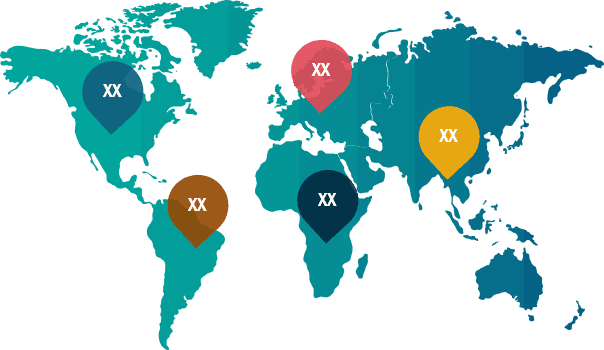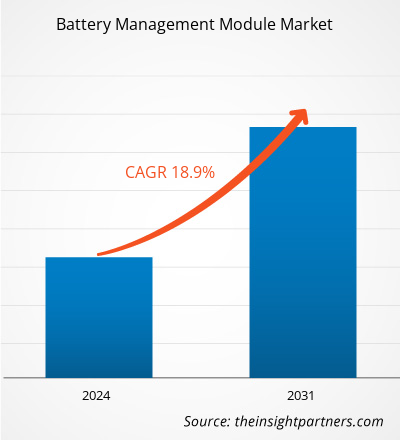电池管理模块市场规模预计将从2023年的81.3亿美元增至2031年的325.7亿美元。预计2023-2031年市场复合年增长率为18.9%。政府对清洁交通的关注和电动汽车采用的增加可能仍然是电池管理模块市场趋势的关键。
电池管理模块市场分析
电池管理模块为各种应用提供了多种优势,包括储能系统、电动汽车和消费电子产品,这导致了它的采用。电池管理模块的一些主要优势包括增强的电池性能、效率、安全性、远程监控和增强的用户体验,从而推动其市场增长。电动汽车中越来越多地采用电池管理模块以及可再生能源系统中对电池管理的需求不断增长是推动电池管理模块市场增长的一些关键因素。
电池管理模块市场概况
电池管理模块或系统是监视和控制电池充电和放电的电子电路。将监测的电池特性包括电池类型、电压、容量、温度、功耗、充电状态、充电周期、剩余工作时间和其他特性。电池管理系统旨在充分利用电池中的剩余能量。为了避免电池过载,电池管理模块可以保护电池免受因极快充电和极高放电电流引起的深度放电和过压。对于多节电池,电池管理系统包括电池平衡功能,以确保所有电池具有相同的充电和放电要求。
定制研究以满足您的要求
我们可以优化和定制我们的标准产品无法满足的分析和范围。这种灵活性将帮助您获得业务规划和决策所需的准确信息。
电池管理模块市场:

年均复合增长率(2023 - 2031)18.9%- 2023 年市场规模
81.3 亿美元 - 2031 年市场规模
325.7 亿美元

市场动态
- 转向可再生能源及其高效存储系统
- 基于AI的电动汽车电池管理系统
- 电动汽车基础设施市场
关键人物;主力;重要一员
- 恩智浦半导体公司
- 模拟器件公司
- 庄信万丰
- 德克萨斯州公司
- 瑞萨电子公司
- 新变
- 埃利锡恩公司
- L&T技术服务
- 锂平衡
- 勒克朗什
区域概况

- 北美
- 欧洲
- 亚太
- 南美洲和中美洲
- 中东和非洲
市场细分
 拓扑结构
拓扑结构- 分散式
- 集中
- 杂交种
 成分
成分- 硬件和软件
 最终用户
最终用户- 汽车
- 医疗的
- 能源与电力
- 消费类电子产品
- 信息技术与电信
- 其他的
- 示例 PDF 通过定性和定量分析展示了内容结构和信息的性质。
电池管理模块市场驱动因素和机遇
转向可再生能源及其高效存储系统以青睐市场
人们越来越关注减少碳排放和防止化石燃料枯竭,导致近年来人们转向可再生能源。光伏和风能是应用最广泛的可再生能源的主要形式。这些能源广泛可用,但就输出和时间而言,它们并不是稳定和连续的来源。必须实施存储解决方案,以便能够随时为负载供电。具有电池储能系统的系统用于存储电力并平衡所需的能量与可从来源获得的能量。他们在电源突然波动时提供频率和电压控制服务。当可再生能源过剩时,电网运营商可以使用电池储能系统来节省电力。电力可以储存在电池中,然后在需求较高时分配到城市、城镇、家庭和工厂。
电动汽车基础设施市场
美国、印度、阿联酋等国家正在实施各种战略来促进电动汽车销售,这将在未来几年提振其市场,并进一步为创造更清洁的环境做出贡献。政府对电动汽车生产的关注产生了对其充电基础设施的需求,其中对电池管理模块的需求不断增长。例如,据白宫称,2023年12月,美国总统的现代美国工业战略重点是建设清洁能源经济。他们到 2050 年实现净零排放的目标需要大规模采用电动汽车 (EV)。总统从两党基础设施法中投资 75 亿美元,用于建设全国电动汽车充电器网络。
电池管理模块市场报告细分分析
有助于得出电池管理模块市场分析的关键部分是拓扑、组件和最终用户。
- 按拓扑结构,市场分为分布式、集中式和混合式。集中式细分市场预计将以最高的复合年增长率增长。
- 根据组件,市场分为硬件和软件。 2023 年,硬件领域占据最大的市场份额。
- 按最终用户划分,市场分为汽车、医疗、能源和电力、消费电子、IT 和电信等。汽车领域预计将以最高的复合年增长率增长。
电池管理模块市场份额按地区分析
电池管理模块市场报告的地理范围主要分为五个地区:北美、亚太、欧洲、中东和非洲、南美/中南美洲。
预计亚太地区的复合年增长率最高。随着该地区电动汽车市场的崛起,对强大充电基础设施的需求催生了对电池管理模块的需求。可再生能源领域对高效电池监控的需求进一步推动了该地区电池管理模块市场的增长。
电池管理模块市场报告范围
| 报告属性 | 细节 |
|---|---|
| 2023年市场规模 | 81.3亿美元 |
| 2031 年市场规模 | 325.7亿美元 |
| 全球复合年增长率(2023 - 2031) | 18.9% |
| 历史数据 | 2021-2022 |
| 预测期 | 2024-2031 |
| 涵盖的细分市场 | 按拓扑结构
|
| 覆盖地区和国家 | 北美
|
| 市场领导者和主要公司简介 |
|
- 示例 PDF 通过定性和定量分析展示了内容结构和信息的性质。
电池管理模块市场新闻和最新动态
电池管理模块市场通过收集初级和二级研究后的定性和定量数据进行评估,其中包括重要的公司出版物、协会数据和数据库。以下是市场发展的列表:
- 2023 年 5 月,森萨塔科技推出了 c-BMS24X 电池管理系统,具有适用于工业应用和低压电动汽车的先进软件功能。 c-BMS24X 使用先进的软件功能,可提高车辆续航里程、正常运行时间、电池健康状况以及多达 24 个串联电池和 2000 安培的应用的性能,例如储能系统 (ESS)、踏板车、三轮车、叉车和AGV。 (来源:森萨塔科技,新闻稿,2023 年)
- 2022 年 5 月,全球领先的汽车供应商马瑞利通过全新的最先进的无线分布式电池管理系统 (wBMS) 扩大了其电动汽车电池管理技术范围。该技术消除了其他电池管理系统 (BMS) 架构中通常需要的有线物理连接,从而实现更大的灵活性、更高的效率、更高的可靠性并降低成本,这些都是电动汽车的关键方面。 (来源:马瑞利,新闻稿,2022 年)
- 2023年5月,NUVATION ENERGY发布了用于固定储能的1500伏电池管理系统。 G5 BMS经过优化,可以满足不断发展的电池储能行业的需求。重大更新包括对 1500 伏电源转换系统的支持,该系统可以通过在每个能量存储系统中包含更多能量来降低存储成本。它还包括系统集成优化,例如每个电池堆栈的硬件占用空间更小以及 Nuvation 专利电池管理算法的更新。 (来源:NUVATION ENERGY,新闻稿,2023 年)
电池管理模块市场报告覆盖范围和可交付成果
《电池管理模块市场规模及预测(2021-2031)》报告对涵盖以下领域的市场进行了详细分析:
- 范围内涵盖的所有关键细分市场的全球、区域和国家层面的市场规模和预测
- 市场动态,例如驱动因素、限制因素和关键机遇
- 未来主要趋势
- 详细的 PEST/波特五力分析和 SWOT 分析
- 全球和区域市场分析,涵盖主要市场趋势、主要参与者、法规和最新市场发展
- 行业格局和竞争分析,涵盖市场集中度、热图分析、知名参与者和最新发展
- 详细的公司简介
- 历史分析(2 年)、基准年、预测(7 年)及复合年增长率
- PEST 和 SWOT 分析
- 市场规模价值/数量 - 全球、区域、国家
- 行业和竞争格局
- Excel 数据集



Report Coverage
Revenue forecast, Company Analysis, Industry landscape, Growth factors, and Trends

Segment Covered
This text is related
to segments covered.

Regional Scope
North America, Europe, Asia Pacific, Middle East & Africa, South & Central America

Country Scope
This text is related
to country scope.
常见问题
The global battery management module market was estimated to be US$ 8.13 billion in 2023 and is expected to grow at a CAGR of 18.9% during the forecast period 2023 - 2031.
The government's focus on cleaner transportation and the increase in the adoption of electric vehicles are the major factors that propel the global battery management module market.
AI-based electric vehicle battery management system is anticipated to play a significant role in the global battery management module market in the coming years.
The key players holding majority shares in the global battery management module market are NXP Semiconductors N.V.; Analog Devices, Inc.; Johnson Matthey; Texas Incorporated, Renesas Electronics Corporation; and Nuvation.
The global battery management module market is expected to reach US$ 32.57 billion by 2031.
The incremental growth expected to be recorded for the global battery management module market during the forecast period is US$ 24.44 billion.
Trends and growth analysis reports related to Electronics and Semiconductor : READ MORE..
The Insight Partners performs research in 4 major stages: Data Collection & Secondary Research, Primary Research, Data Analysis and Data Triangulation & Final Review.
- Data Collection and Secondary Research:
As a market research and consulting firm operating from a decade, we have published and advised several client across the globe. First step for any study will start with an assessment of currently available data and insights from existing reports. Further, historical and current market information is collected from Investor Presentations, Annual Reports, SEC Filings, etc., and other information related to company’s performance and market positioning are gathered from Paid Databases (Factiva, Hoovers, and Reuters) and various other publications available in public domain.
Several associations trade associates, technical forums, institutes, societies and organization are accessed to gain technical as well as market related insights through their publications such as research papers, blogs and press releases related to the studies are referred to get cues about the market. Further, white papers, journals, magazines, and other news articles published in last 3 years are scrutinized and analyzed to understand the current market trends.
- Primary Research:
The primarily interview analysis comprise of data obtained from industry participants interview and answers to survey questions gathered by in-house primary team.
For primary research, interviews are conducted with industry experts/CEOs/Marketing Managers/VPs/Subject Matter Experts from both demand and supply side to get a 360-degree view of the market. The primary team conducts several interviews based on the complexity of the markets to understand the various market trends and dynamics which makes research more credible and precise.
A typical research interview fulfils the following functions:
- Provides first-hand information on the market size, market trends, growth trends, competitive landscape, and outlook
- Validates and strengthens in-house secondary research findings
- Develops the analysis team’s expertise and market understanding
Primary research involves email interactions and telephone interviews for each market, category, segment, and sub-segment across geographies. The participants who typically take part in such a process include, but are not limited to:
- Industry participants: VPs, business development managers, market intelligence managers and national sales managers
- Outside experts: Valuation experts, research analysts and key opinion leaders specializing in the electronics and semiconductor industry.
Below is the breakup of our primary respondents by company, designation, and region:

Once we receive the confirmation from primary research sources or primary respondents, we finalize the base year market estimation and forecast the data as per the macroeconomic and microeconomic factors assessed during data collection.
- Data Analysis:
Once data is validated through both secondary as well as primary respondents, we finalize the market estimations by hypothesis formulation and factor analysis at regional and country level.
- Macro-Economic Factor Analysis:
We analyse macroeconomic indicators such the gross domestic product (GDP), increase in the demand for goods and services across industries, technological advancement, regional economic growth, governmental policies, the influence of COVID-19, PEST analysis, and other aspects. This analysis aids in setting benchmarks for various nations/regions and approximating market splits. Additionally, the general trend of the aforementioned components aid in determining the market's development possibilities.
- Country Level Data:
Various factors that are especially aligned to the country are taken into account to determine the market size for a certain area and country, including the presence of vendors, such as headquarters and offices, the country's GDP, demand patterns, and industry growth. To comprehend the market dynamics for the nation, a number of growth variables, inhibitors, application areas, and current market trends are researched. The aforementioned elements aid in determining the country's overall market's growth potential.
- Company Profile:
The “Table of Contents” is formulated by listing and analyzing more than 25 - 30 companies operating in the market ecosystem across geographies. However, we profile only 10 companies as a standard practice in our syndicate reports. These 10 companies comprise leading, emerging, and regional players. Nonetheless, our analysis is not restricted to the 10 listed companies, we also analyze other companies present in the market to develop a holistic view and understand the prevailing trends. The “Company Profiles” section in the report covers key facts, business description, products & services, financial information, SWOT analysis, and key developments. The financial information presented is extracted from the annual reports and official documents of the publicly listed companies. Upon collecting the information for the sections of respective companies, we verify them via various primary sources and then compile the data in respective company profiles. The company level information helps us in deriving the base number as well as in forecasting the market size.
- Developing Base Number:
Aggregation of sales statistics (2020-2022) and macro-economic factor, and other secondary and primary research insights are utilized to arrive at base number and related market shares for 2022. The data gaps are identified in this step and relevant market data is analyzed, collected from paid primary interviews or databases. On finalizing the base year market size, forecasts are developed on the basis of macro-economic, industry and market growth factors and company level analysis.
- Data Triangulation and Final Review:
The market findings and base year market size calculations are validated from supply as well as demand side. Demand side validations are based on macro-economic factor analysis and benchmarks for respective regions and countries. In case of supply side validations, revenues of major companies are estimated (in case not available) based on industry benchmark, approximate number of employees, product portfolio, and primary interviews revenues are gathered. Further revenue from target product/service segment is assessed to avoid overshooting of market statistics. In case of heavy deviations between supply and demand side values, all thes steps are repeated to achieve synchronization.
We follow an iterative model, wherein we share our research findings with Subject Matter Experts (SME’s) and Key Opinion Leaders (KOLs) until consensus view of the market is not formulated – this model negates any drastic deviation in the opinions of experts. Only validated and universally acceptable research findings are quoted in our reports.
We have important check points that we use to validate our research findings – which we call – data triangulation, where we validate the information, we generate from secondary sources with primary interviews and then we re-validate with our internal data bases and Subject matter experts. This comprehensive model enables us to deliver high quality, reliable data in shortest possible time.

 获取此报告的免费样本
获取此报告的免费样本